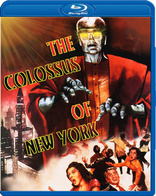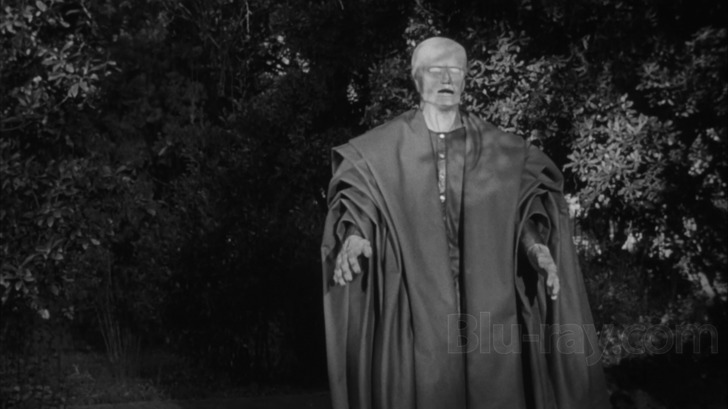The Colossus of New York Blu-ray Movie
HomeThe Colossus of New York Blu-ray Movie 
Olive Films | 1958 | 70 min | Not rated | Jun 19, 2012
Movie rating
6.6 | / 10 |
Blu-ray rating
| Users | 0.0 | |
| Reviewer | 3.5 | |
| Overall | 3.5 |
Overview
The Colossus of New York (1958)
Jeremy Spensser, genius humanitarian, is killed in an accident just after winning the Nobel Peace Prize. His father William, a brilliant brain surgeon, works on the body in secret before burial; later revealing to his other son Henry that he has the brain on life support and hopes to encase it in a robot body! The resulting being is large, strong, and develops many strange powers. Initially it has Jeremy's gentle personality but this, too, begins to change, and a year later it decides to end its long seclusion... Unusual piano music score.
Starring: John Baragrey, Mala Powers, Otto Kruger, Ross Martin, Charles Herbert (I)Director: Eugène Lourié
| Sci-Fi | 100% |
Specifications
Video
Video codec: MPEG-4 AVC
Video resolution: 1080p
Aspect ratio: 1.78:1
Original aspect ratio: 1.85:1
Audio
English: DTS-HD Master Audio Mono
Subtitles
None
Discs
25GB Blu-ray Disc
Single disc (1 BD)
Playback
Region A (B, C untested)
Review
Rating summary
| Movie | 3.0 | |
| Video | 4.0 | |
| Audio | 3.5 | |
| Extras | 0.0 | |
| Overall | 3.5 |
The Colossus of New York Blu-ray Movie Review
A little movie about a big monster.
Reviewed by Jeffrey Kauffman June 7, 2012There probably isn’t a child alive who hasn’t thought at some point that his or her parents were monsters, but The Colossus of New York takes that idea to extremes. This low budget 1958 Paramount science fiction thriller was another of producer William Alland’s lo-fi quickie fare, a kind of companion piece of sorts to his The Space Children, which not so coincidentally is being released in tandem with The Colossus of New York by Olive Films. It wouldn’t be that surprising to find out that these two films were paired theatrically in 1958, especially at drive-ins (remember those?), as they’re both the sort of moderately entertaining knockoffs that would play perfectly for a family or dating teens perhaps not totally focused on what is happening on the screen. The Colossus of New York is probably the more serious of the two films, at least in execution, though “serious” is a decidedly relative term here, especially since modern day audiences may be howling with laughter at sequences which no doubt played much more dramatically in the more innocent late fifties. Much like The Space Children, The Colossus of New York clocks in at barely over an hour, but unlike the other film, that brevity actually seems to work better for this outing that may remind viewers of any number of other properties, from Frankenstein to Donovan’s Brain.

The Space Children had a coterie of actors who went on to some considerable television fame (some would say infamy), but Colossus of New York really only has one really recognizable television performer in its cast, Ross Martin, who would go on to play Artemis Gordon in The Wild Wild West. (Mala Powers had a recurring role on Hazel, but few would probably associate her with that part.) Martin portrays brilliant scientist Jeremy Spensser who, as the film opens, has just won an “International Peace Prize”, something that doesn’t seem to sit especially well with his brother, Henry (John Baragrey). Offsetting the sibling rivalry is the adoring adulation that Jeremy receives from his wife, Anne (Mala Powers) and his legendary brain surgeon father, William (Otto Kruger). Jeremy’s young son Billy (Charles Herbert) seems rather nonplussed by his father’s new celebrity and instead wants the family to focus on a newsreel they’ve been watching which is actually touting one of Henry’s achievements.
Upon Jeremy’s return to the United States after having received his prize, tragedy strikes at the airport when the doting father chases after a toy airplane of his son’s and gets struck and killed by a marauding delivery truck. Though he’s pronounced dead at the scene, William has the body taken back to his own private laboratory where he promises to do all he can to revive his son. The family waits grief stricken in a sort of cathedral narthex until William finally emerges, simply saying he had done all he could, with the clear implication being that Jeremy had indeed perished. A somewhat laughable cut to Jeremy’s body lying in state in a casket with a large bandage wrapped around its head is the first clue that William has perhaps come up with an alternate plan to keep some vestige of his award winning son among the living. That vestige of course turns out to be Jeremy’s brain, which William has removed and is keeping in a sort of quasi-frozen animated state where only questions shouted at it through a microphone raising it from its virtual slumber.
William soon convinces Henry to build the brain a robotic “home”, so to speak, which of course is the Colossus, a frankly scary looking contraption that William is sure will convince Jeremy he’s still alive and able to continue his scientific pursuits. That dream comes crashing down as soon as Jeremy takes a gander at his new metallic body in a large mirror in the lab (you’d think a doctor of William’s brilliance might have seen that one coming). That is the beginning of Jeremy’s rather precipitous descent into madness, something exacerbated by the fact that he’s initially led to believe his wife and child are dead, and then, later, finding out that not only are they alive, Anne is starting to respond to Henry’s advances.
The Colossus of New York is frankly more creepy than it is an outright scarefest, and part of the creepiness is in its own strange way the same horror that is felt in outings like Johnny Got His Gun, where an active consciousness can’t quite believe the predicament it’s found itself in. The melodrama here is kind of silly, but the film manages to actually deliver a little heartfelt emotion when the Colossus comes across little Billy laying flowers at his father’s grave. By that time, however, Jeremy’s consciousness has largely lost touch with reality and the Colossus has become something of a megalomaniac and the creature is convinced humans are the problem and need to be eradicated (isn’t that always the way?).
Otto Kruger will be recognizable to all sorts of movie and television fans, even if they’re not quite sure where they’ve seen the veteran actor before, and he does a nice job here of showing William’s desperation as well as his determination to somehow preserve some semblance of Jeremy’s life. Kruger has just the hint of seediness about his portrayal, something that brings a hint of horror outings like the somewhat thematically similar Frankenstein to this enterprise.
This film doesn’t have the same relatively focused message that The Space Children does, and in fact its “message”, if indeed there even is one, is pretty murky. What does killing a bunch of peace lovers at the United Nations accomplish, anyway? At least the Colossus’ jealousy with regard to Henry and his wife is something viewers can understand on a personal, visceral level. The climax at the UN in the film is just patently silly, not helped by a less than epic set (though the process photography is rather good). Unintended hilarity ensues after the Colossus has gone on a rampage and is then put out of commission by little Billy himself (at the Colossus’ own urging). At that point, William kind of looks around at the carnage and pretty much just says, “Oops, sorry about that.”
The Colossus of New York Blu-ray Movie, Video Quality 

The Colossus of New York is presented on Blu-ray courtesy of Olive Films with an AVC encoded 1080p transfer in 1.78:1. It's a bit of a head scratcher why this 1958 Paramount catalog release looks so much sharper and better defined than The Space Children does, but that is certainly the case. Unlike The Space Children, contrast in The Colossus of New York is quite strong and consistent, and the film benefits from some deep black levels, appealing and variegated gray scale and bright whites. The image is generally very clear and fine object detail is quite pleasing (to the point where, for example, the final shot of the Colossus reveals the human's eyes inside the costume's mask). Grain is natural looking, though as should be expected there's added grain and softness in some of the film's opticals.
The Colossus of New York Blu-ray Movie, Audio Quality 

The Colossus of New York features a lossless DTS-HD Master Audio Mono mix that serves this film rather well, especially with regard to the unusual piano score by Van Cleave (there was evidently a musician's strike at the time, necessitating this stripped down approach to underscoring, though note that the party scene offers a source cue featuring strings). Dialogue is cleanly and clearly presented and the film's cool, static filled sound effects sound really excellent in this presentation. Fidelity is excellent throughout the film and dynamic range is decently wide if never really overwhelming. There is no damage to report on this track.
The Colossus of New York Blu-ray Movie, Special Features and Extras 

Once again as is usual with these Paramount catalog releases offered by Olive Films, there are no supplements of any kind on this Blu-ray disc.
The Colossus of New York Blu-ray Movie, Overall Score and Recommendation 

The Colossus of New York is undeniably silly a lot of the time, but it's also moodily effective, especially in its depiction of Jeremy's isolation and helplessness at finding "himself" inhabiting a large metal Colossus. The film, much like The Space Children, is a bit too rushed and hurried to ever build up anything approaching dramatic momentum, but it is actually a relatively more effective film than The Space Children is, with some very effective sequences. This Blu-ray offers excellent video and audio and even without any supplements, this release comes Recommended.
Similar titles
Similar titles you might also like

The Killer Shrews
1959

The Giant Claw
1957

This Island Earth
1955

Dr. Goldfoot and the Bikini Machine
1965

The Bride of Frankenstein
1935

The Neanderthal Man
1953

The Dungeonmaster
Ragewar
1984

Frankenstein 4K
1931

The Freakmaker
1974

The Astro-Zombies
Space Vampires / Space Zombies
1968

The Creep Behind the Camera / The Creeping Terror
1964

Mad Doctor of Blood Island
Grave Desires / Tomb of the Living Dead
1968

Doctor X
Warner Archive Collection
1932

The Wasp Woman
1959

Jungle Captive
1945

From Hell It Came
Warner Archive Collection
1957

Metamorphosis
1990

Robot Monster 3D
Monsters from the Moon
1953

The Brain That Wouldn't Die
1962

The Kindred
1987
